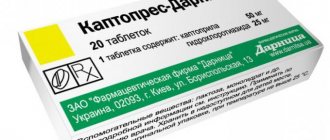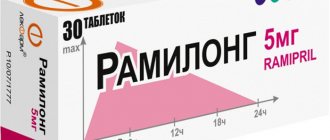Pharmacological effect
The drug Captopril is an antihypertensive drug, also classified as an ACE inhibitor. The enzyme angiotensin II has a vasoconstrictor effect in the body, spasm of the smooth muscles of the veins and arteries, which causes an increase in blood pressure. Captopril inhibits the conversion of the enzyme angiotensin I to angiotensin II. This property of the drug allows you to reduce peripheral pressure, relieve stress on the heart muscle, normalize a person’s condition, and prevent complications that arise from cardiovascular pathologies. In addition, the product helps improve blood flow in the kidneys.
Pharmacokinetics
After entering the stomach, the drug Captopril is actively absorbed from the digestive tract, due to which the therapeutic effect occurs quite quickly. Eating at the same time can slow it down. The maximum concentration of the active component in the blood is observed after 1 - 1.5 hours.
Metabolism occurs in the liver. The drug is excreted by the kidneys. Unchanged - from 40 to 50% of the substance. The remainder is in the form of metabolites. In case of renal failure, a cumulation effect is possible, that is, accumulation of the active component in the organ.
Important! Captopril can be excreted in mother's milk, so the use of the drug during lactation is contraindicated.
How quickly does the drug work?
How long does it take for Captopril to work, patients with regular surges in blood pressure ask. The drug is characterized by good absorption into the blood serum, and the peak of action begins 15–60 minutes after administration. If a patient has just eaten and then taken a Captopril tablet, this can reduce the effectiveness of the drug by up to 40%. Therefore, doctors recommend taking the medication 1.5 hours after eating.
Also, many hypertensive patients are interested in whether to drink Captopril with water, or would it be more correct to put it under the tongue? There have been no special studies on this matter, so it is impossible to say that one of these methods of using tablets is correct and the other is not. You should try both options, after taking it, monitoring your blood pressure level using a tonometer and focusing on your own sensations. For some patients, resorption of Captopril under the tongue brings a greater effect than oral administration, while for others it is more common to take tablets with water.
Indications for use
What does Captopril help with? A drug is prescribed to relieve hypertensive crises and lower blood pressure. Indications for the use of Captopril are as follows:
- increased blood pressure due to kidney disease;
- rise in blood pressure, the etiology of which is unknown;
- hypertension resistant to medication;
- cardiomyopathy in patients;
- congestive processes in heart failure;
- diabetic nephropathies;
- autoimmune nephropathy;
- dysfunction of the left ventricle of the heart caused by myocardial infarction;
- hypertension in patients suffering from bronchial asthma.
Captopril is used to relieve high blood pressure
The use of Captopril should be carried out only as prescribed by a doctor, since the medicine has a number of serious contraindications.
Contraindications:
Hypersensitivity to captopril or other ACE inhibitors; angioedema (history of ACE inhibitor therapy or hereditary); severe dysfunction of the liver and/or kidneys; hyperkalemia; bilateral renal artery stenosis, stenosis of the artery of a single kidney with progressive azotemia, condition after kidney transplantation, stenosis of the aortic mouth and similar changes that impede the outflow of blood from the left ventricle, pregnancy, lactation, age under 18 years (efficacy and safety have not been established).
Rare hereditary galactose intolerance, lactase deficiency, glucose-galactose malabsorption syndrome.
Concomitant use with aliskiren and drugs containing aliskiren is contraindicated in patients with diabetes mellitus and/or moderate or severe renal impairment (glomerular filtration rate (GFR) less than 60 ml/min/1.73 m2 body surface area.
Concomitant use with angiotensin II receptor antagonists (ARI) in patients with diabetic nephropathy is contraindicated.
Concomitant use with neutral endopeptidase inhibitors (for example, with drugs containing sacubitril) due to the high risk of developing angioedema.
For whom the drug is contraindicated
The drug in question is widely used in medical practice, but when prescribing it, the contraindications of Captopril should be taken into account. These include:
- narrowing of the aortic lumen;
- disturbance of sodium-potassium balance in the body due to increased synthesis of aldosterone by the adrenal cortex;
- deterioration in the functioning of the mitral valve, its narrowing;
- recent kidney transplant surgery;
- period of bearing a child;
- tendency to edema;
- myocardiopathy;
- Quincke's edema;
- lactose deficiency;
- breastfeeding period;
- personal intolerance to the drug substances;
- The patient's age is under 18 years.
Failure to comply with the contraindications described above provokes the development of serious consequences and can cause serious harm to the health and life of the patient.
Use during pregnancy and breastfeeding:
The use of Captopril-STI is contraindicated during pregnancy.
The drug Captopril-STI should not be used in the first trimester of pregnancy. There have been no adequate controlled studies of the use of ACE inhibitors in pregnant women. The limited available data on the effects of the drug in the first trimester of pregnancy indicate that the use of ACE inhibitors does not lead to fetal malformations associated with fetotoxicity. Epidemiological data demonstrating a risk of teratogenicity after exposure to ACE inhibitors in the first trimester of pregnancy have not been convincing, but some increased risk cannot be excluded. If the use of an ACE inhibitor is considered necessary, patients planning pregnancy should be switched to alternative antihypertensive therapy that has an established safety profile for use during pregnancy.
It is known that long-term exposure of the fetus to ACE inhibitors in the second and third trimesters of pregnancy can lead to disruption of its development (decreased renal function, oligohydramnios, delayed ossification of the skull bones) and the development of complications in the newborn (such as renal failure, arterial hypotension, hyperkalemia) . If the patient received Captopril-STI during the second and third trimesters of pregnancy, it is recommended to conduct an ultrasound examination to assess the condition of the skull bones and fetal kidney function.
The use of ACE inhibitors during pregnancy can cause developmental disorders (including arterial hypotension, neonatal hypoplasia of the skull, anuria, reversible or irreversible renal failure) and fetal death. If pregnancy is established, the use of Capotopril-STI should be discontinued as soon as possible.
Approximately 1% of a given dose of captopril is found in breast milk. Due to the risk of serious adverse reactions in the child, breastfeeding should be stopped or therapy with Captopril-STI should be discontinued in the mother during the period of breastfeeding.
Medicine dosage
Instructions for use of the medicine describe how to take Captopril for various conditions. The therapeutic effect depends on how correctly the dosage of the drug was selected.
During treatment, the dosage of the medication must be strictly observed.
For arterial hypertension
The prescription for Captopril for hypertension is selected exclusively by a specialist, based on medical history and blood pressure readings. Depending on the mercury level, the daily dosage at the beginning of treatment is usually from 100 to 150 mg of the drug. The tablets are divided into several doses at equal intervals of time. If there is no desired effect, the dose is increased. In addition to Captopril, your doctor may prescribe other medications, such as diuretics.
For heart failure and hypovolemia
Patients with these diseases are prescribed a single use of the drug. First, patients drink 6.25 – 12.5 mg. After a week, the dose is doubled and divided into two doses. During therapy, blood pressure should be measured regularly. If the desired result is not achieved, the dosage is increased to 60–100 mg.
After myocardial infarction (short-term treatment)
During the first 24 hours, it is recommended to take 6 to 12 mg of the drug. After a day, the dosage is increased to 25 mg. On the third day and subsequent days - 100 mg Captopril. The total duration of treatment is up to 4 weeks, which can be extended by a specialist.
Long-term treatment of myocardial infarction
Captopril is used 3 to 16 days after the attack. Therapy is carried out under the close supervision of medical personnel in a hospital setting. First, the patient is given 6.25 mg. Every other day - 12 mg, divided into 2 doses. After a few days - 25 mg for 3 doses. In this way, the dosage increases to 100 – 150 mg. The duration of treatment is determined depending on the work of the heart and the dynamics of pressure, heart rate and other indicators.
Relief of hypertensive crisis
To lower blood pressure, you need to put Captopril under the tongue. After a quarter of an hour, the dose is repeated, but no more than 3 tablets per day. If the patient takes Nitroglycerin in combination with the drug, the dose of Captopril is reduced to 2 tablets.
Treatment of diabetic nephropathy
Patients with diabetic nephropathy are prescribed 75 to 100 mg of the drug per day. The dose is divided into 3 equal parts. The tablets must be swallowed with sufficient liquid. Captopril is more often used as a complex therapy with the simultaneous use of other drugs that reduce blood pressure.
The dose of the drug varies for different diseases
Important! The above information is provided for informational purposes only. Using any of the schemes on your own is extremely dangerous to your health.
Captopril
Arterial hypotension
In patients with arterial hypertension, when using captopril, severe arterial hypotension is observed only in rare cases. The likelihood of developing this condition increases with increased fluid loss and hyponatremia (for example, after intensive treatment with diuretics, restriction of sodium intake, in patients on dialysis, and in patients with diarrhea or vomiting).
Captopril should be prescribed with caution to patients on a low-salt or salt-free diet. Circulating blood volume and blood sodium levels should be adjusted before captopril is prescribed. The possibility of a sharp decrease in blood pressure can be minimized by first withdrawing (4-7 days before) the diuretic or increasing sodium chloride intake (about a week before starting treatment), or by prescribing low doses of captopril at the beginning of treatment (6.25-12 .5 mg/day). Renal function should be regularly monitored before and during treatment with captopril. Excessive reduction in blood pressure due to antihypertensive medications may increase the risk of myocardial infarction or stroke in patients with coronary heart disease or cerebrovascular disease. If arterial hypotension develops, the patient should take a horizontal position with legs elevated.
Intravenous administration of 0.9% sodium chloride solution may be required.
In patients with CHF, a transient decrease in blood pressure by more than 20% of the initial value is observed in approximately half of the cases. The degree of reduction in blood pressure is maximum in the early stages of treatment (after taking the first few doses of captopril) and stabilizes within one to two weeks from the start of treatment. Blood pressure usually returns to baseline without a decrease in therapeutic efficacy within two months. In patients with CHF, treatment should begin with low doses of captopril (6.25-12.5 mg/day) under medical supervision. Increasing the dose of captopril should be done with extreme caution. Transient arterial hypotension in itself is not a reason to discontinue treatment. In cases where arterial hypotension becomes stable, the dose should be reduced and/or discontinued use of the diuretic and/or captopril.
Aortic or mitral stenosis/hypertrophic obstructive cardiomyopathy
Like all drugs that have a vasodilating effect, ACE inhibitors should be used with extreme caution in patients with left ventricular outflow tract obstruction. In case of hemodynamically significant obstruction, the use of captopril is not recommended.
Renal dysfunction
Some patients with kidney disease, especially those with severe renal artery stenosis, experience increases in serum urea nitrogen and creatinine concentrations after lowering blood pressure. This increase is usually reversible when captopril therapy is discontinued. In these cases, it may be necessary to reduce the dose of captopril and/or discontinue the diuretic.
With long-term use of captopril, approximately 20% of patients experience an increase in serum urea and creatinine concentrations by more than 20% compared to normal or baseline values.
In less than 5% of patients, especially with severe nephropathy, treatment discontinuation is required due to an increase in creatinine concentration.
Renovascular hypertension
Patients with bilateral renal artery stenosis or stenosis of the artery of a solitary kidney have an increased risk of developing arterial hypotension and renal failure when using ACE inhibitors. Renal failure may initially manifest itself as only slight changes in plasma creatinine levels. The use of captopril in such patients is not recommended.
Kidney transplant
There is no experience with the use of captopril in patients who have recently undergone kidney transplantation. Therefore, the use of captopril in such patients is not recommended.
Proteinuria
When using captopril, 0.7% of patients experienced proteinuria greater than 1000 mg per day. In 90% of cases, proteinuria occurred in patients with impaired renal function, as well as when using high doses of captopril (more than 150 mg per day). Approximately 20% of patients with proteinuria developed nephrotic syndrome. In most cases, proteinuria disappeared or decreased in severity after taking captopril within 6 months, regardless of whether the drug was stopped or not. Renal function indicators (blood urea nitrogen and creatinine concentrations) in
patients with proteinuria were almost always within normal limits. In patients with kidney disease, the protein content in the urine should be determined before starting treatment and periodically throughout the course of therapy.
Liver dysfunction
In rare cases, the use of ACE inhibitors has been accompanied by the development of a syndrome that begins with the appearance of cholestatic jaundice or hepatitis and progresses to fulminant liver necrosis, sometimes with death. The mechanism of development of this syndrome is unknown. If a patient receiving ACE inhibitor therapy develops jaundice or a significant increase in liver enzyme activity, captopril treatment should be discontinued and appropriate adjuvant therapy should be instituted. The patient should be under appropriate supervision.
Neutropeia/agranulocytosis/thrombocytopeia/anemia
In patients taking ACE inhibitors. cases of neutropenia/agranulocytosis, thrombocytopenia and anemia were noted. Neutropenia is rare in patients with normal renal function and no other abnormalities. In renal failure, simultaneous administration of captopril and allopurinol led to neutropenia.
Captopril should be used with extreme caution in patients with systemic connective tissue diseases (systemic lupus erythematosus, scleroderma, etc.) taking immunosuppressants, allopurinol or procainamide, or a combination of these complicating factors, especially if there are pre-existing renal dysfunction.
In 13% of cases, neutropenia resulted in death. In almost all cases, death was observed in patients with connective tissue diseases, renal or heart failure, while taking immunosuppressants, or a combination of both of these factors.
Due to the fact that the majority of fatal cases of neutropenia due to ACE inhibitors developed in such patients, their white blood cell count should be monitored before starting treatment, in the first 3 months - every 2 weeks, then every 2 months. In all patients, the number of leukocytes in the blood should be monitored monthly in the first 3 months after starting captopril therapy, then every 2 months. If the number of leukocytes is below 4000/μl, a repeat general blood test is indicated; below 1000/μl, the drug is stopped while monitoring the patient continues. Typically, restoration of the number of neutrophils occurs within 2 weeks after discontinuation of captopril.
Some patients developed serious infectious diseases, which in some cases did not respond to intensive antibiotic therapy. When using captopril in patients with a high risk of neutropenia/agranulocytosis, regular monitoring of the number of leukocytes in the blood is recommended. Patients should be warned to seek immediate medical attention if any signs of an infectious disease (eg, fever, sore throat) occur.
Hypersensitivity reactions/agioedema
Rare cases of angioedema of the face, extremities, lips, tongue, vocal folds and/or larynx have been observed with the use of ACE inhibitors, including captopril. Angioedema may develop at any time during treatment. If angioedema develops, you should immediately stop taking captopril and carefully monitor the patient's condition until symptoms disappear completely.
If the swelling is localized to the face, no special treatment is usually required (antihistamines can be used to reduce the severity of symptoms). Even in cases where only swelling of the tongue is observed without the development of respiratory distress syndrome, patients may require long-term observation, since therapy with antihistamines and corticosteroids may not be sufficient.
Angioedema, associated with swelling of the larynx and tongue, can be fatal in very rare cases. If the swelling spreads to the tongue, pharynx or larynx and there is a threat of developing airway obstruction, 0.3-0.5 ml of a 0.1% solution of epinephrine (adrenaline) should be immediately administered subcutaneously and/or the airway should be ensured ( intubation or tracheostomy). In rare cases, during therapy with ACE inhibitors, intestinal edema (angioedema of the intestines) has developed, which is manifested by abdominal pain in combination with or without nausea and vomiting, sometimes without previous angioedema of the face and with normal levels of Cl-esterase. Diagnosis is made using abdominal computed tomography, ultrasound, or surgery. Symptoms disappeared after stopping the ACE inhibitors. The possibility of developing intestinal edema must be taken into account when carrying out the differential diagnosis of abdominal pain in patients taking ACE inhibitors.
Patients with a history of angioedema not associated with ACE inhibitors may be at greater risk of developing angioedema during ACE inhibitor therapy.
In representatives of the Negroid race, cases of the development of angioedema when using ACE inhibitors were observed with a higher frequency compared to representatives of other races.
An increased risk of angioedema was observed in patients concomitantly taking ACE inhibitors and drugs such as mTOR inhibitors (temsirolimus, sirolimus, everolimus), dipeptidyl peptidase type IV inhibitors (sitagliptin, saxagliptin, vildagliptin, linagliptin), estramustine, neutral endopeptidase inhibitors (racecadotril). , sacubitril) and tissue plasminogen activators.
Anaphylactoid reactions during desensitization with an allergen from Hymenoptera venom
In rare cases, during therapy with ACE inhibitors, life-threatening anaphylactoid reactions were observed in patients undergoing desensitization with an allergen from the venom of Hymenoptera. In such patients, these reactions were prevented by temporarily stopping ACE inhibitor therapy before desensitization began. The use of captopril should be avoided in patients receiving bee venom immunotherapy.
Anaphylactoid reactions during low-density lipoprotein apheresis (LDL apheresis)
Life-threatening anaphylactoid reactions have rarely been observed in patients taking ACE inhibitors during LDL apheresis using dextran sulfate. The development of these reactions can be prevented by temporarily stopping the inhibitor
ACE before each LDL apheresis procedure.
Hemodialysis using high-flow membranes
When performing hemodialysis in patients receiving ACE inhibitors, the use of high-flow polyacrylonitrile dialysis membranes (for example, AN69®) should be avoided, since in such cases the risk of developing anaphylactoid reactions increases. In such cases, it is necessary to use a different type of dialysis membrane or use antihypertensive drugs of other classes.
Diabetes
In patients with diabetes mellitus receiving oral hypoglycemic agents or insulin while using ACE inhibitors, blood glucose concentrations should be regularly monitored.
Patients taking oral hypoglycemic agents or insulin should be informed before starting the use of ACE inhibitors of the need to regularly monitor blood glucose concentrations (hypoglycemia), especially during the first month of simultaneous use of these drugs.
Cough
When taking ACE inhibitors, a characteristic cough is often observed. As a rule, the cough is non-productive, constant and stops after discontinuation of the drug. Cough associated with the use of ACE inhibitors. should be taken into account in the differential diagnosis of dry cough.
Surgery/general anesthesia
During major surgical operations, as well as when using general anesthesia agents that have an antihypertensive effect, patients taking ACE inhibitors may experience an excessive decrease in blood pressure (since captopril blocks the formation of angiotensin II, caused by compensatory release of renin). In such cases, to correct low blood pressure, measures aimed at increasing the volume of circulating blood are used.
Hyperkalemia
In some cases, against the background of the use of ACE inhibitors, incl. captopril, an increase in serum potassium levels is observed.
Risk factors for the development of hyperkalemia are renal failure, old age (over 65 years), diabetes mellitus, some concomitant conditions (decrease in blood volume, acute heart failure in the stage of decompensation, metabolic acidosis), simultaneous use of potassium-sparing diuretics (such as spironolactone, eplerenone, triamterene or amiloride), as well as potassium preparations, potassium-containing table salt substitutes and other drugs that increase the level of potassium in the blood plasma (such as heparin, tacrolimus, cyclosporine; drugs containing cotrimoxazole [trimethoprim + sulfamethoxazole]).
The use of potassium supplements, potassium-sparing diuretics, or potassium-containing table salt substitutes, especially in patients with impaired renal function, can lead to a significant increase in serum potassium levels. Hyperkalemia can cause serious heart rhythm disturbances, sometimes fatal. It is recommended to avoid the simultaneous use of potassium-sparing diuretics and potassium supplements. If it is necessary to simultaneously use captopril and the drugs listed above containing potassium or increasing the potassium content in the blood plasma, caution should be exercised and the potassium content in the blood serum should be regularly monitored.
Hypokalemia
When using ACE inhibitors simultaneously with thiazide diuretics, the risk of hypokalemia cannot be excluded. Therefore, in such cases, regular monitoring of potassium levels in the blood should be carried out during therapy.
Dual blockade of the renin-angiotensin-aldosterone system (RAAS)
The simultaneous use of drugs from different groups that act on the RAAS is not recommended (double blockade of the RAAS), since it has been associated with an increased incidence of side effects such as arterial hypotension, hyperkalemia, and decreased renal function (including acute renal failure). The simultaneous use of ACE inhibitors with medicinal products containing aliskiren is contraindicated in patients with diabetes mellitus and/or with moderate or severe renal impairment (GFR less than 60 ml/min/1.73 m2 body surface area) and is not recommended in other patients.
Concomitant use of ACE inhibitors with angiotensin II receptor antagonists is contraindicated in patients with diabetic nephropathy and is not recommended in other patients.
In cases where the simultaneous administration of two drugs acting on the RAAS is necessary, their use should be carried out under the supervision of a physician with extreme caution and with regular monitoring of renal function, blood pressure and electrolyte levels in the blood plasma.
Lithium preparations
The simultaneous use of captopril and drugs containing lithium is not recommended due to the risk of potentiating the toxicity of the latter.
Ethnic differences
ACE inhibitors are less effective in blacks than in Caucasians, which may be due to the higher prevalence of low renin activity in blacks.
Other
When taking captopril, a false-positive urine test for acetone may occur.
Use among pregnant women
Women carrying a baby often experience increased blood pressure. This is due to changes that occur in the body, exacerbation of cardiovascular pathologies. This leads to the question of whether pregnant women can take the drug in question? Captopril during pregnancy is contraindicated in any trimester. If necessary, the drug can be prescribed in the second and third trimester under the close supervision of a leading physician.
During lactation, the drug should also be avoided. If the doctor has prescribed a remedy, stop breastfeeding.
Alcohol compatibility
The compatibility of Captopril and alcohol is extremely undesirable. This combination leads to a decrease in the body’s absorption of potassium, because alcoholic drinks wash this trace element out of the body. A lack of potassium provokes, in turn, a persistent increase in blood pressure.
After drinking alcohol, the use of Captopril is also often ineffective. This is especially true for hypertension caused by potassium deficiency. If an increase in pressure is observed against the background of impaired functioning of the cardiovascular system, the use of the medicine is allowed.
In addition, Captopril and alcohol are allowed to be combined to relieve a hypertensive crisis due to a hangover, with the exception of those patients who have renal failure.
Drug interactions
When prescribing tablets, the specialist must take into account their interaction with other drugs:
- simultaneous use of the drug with immunosuppressants and cytostatics increases the risk of developing leukopenia;
- the threat of hyperkalemia increases with treatment with Captopril and potassium-sparing diuretics, vitamin complexes containing potassium, dietary supplements;
- if the patient simultaneously takes Captopril and non-steroidal anti-inflammatory drugs, renal dysfunction may develop;
- careless combination of Captopril and diuretics increases the risk of developing persistent hypotension;
- severe hypotension is diagnosed when Captopril is combined with anesthesia;
- Aspirin reduces the effect of the drug in question;
- reduces the effectiveness of Captopril Indomethacin, Ibuprofen;
- simultaneous administration of Captopril with medications containing insulin increases the risk of developing hypoglycemia. This happens by increasing the body's tolerance to glucose;
- ACE inhibitors in combination with the drug in question can cause a persistent decrease in blood pressure.
Important! If the patient is taking Captopril and there is a need to use any other drugs, this should be discussed with the attending physician.
Carefully:
Severe autoimmune connective tissue diseases (including systemic lupus erythematosus, scleroderma), suppression of bone marrow hematopoiesis (risk of developing neutropenia and agranulocytosis), cerebral ischemia, diabetes mellitus (increased risk of developing hyperkalemia), patients on hemodialysis, diet with sodium restriction, primary hyperaldosteronism, coronary heart disease, conditions accompanied by a decrease in circulating blood volume (including vomiting, diarrhea), old age (dose adjustment required).
Side effects
Sometimes, while taking the medication, side effects of Captopril develop. Violations are observed in various organs and systems. These include:
- allergic reaction - redness, itching, swelling of the dermis, urticaria, nasal congestion, conjunctivitis;
- blood composition disorder;
- deterioration in the functioning of the urinary system, protein in the urine;
- from the respiratory system – barking dry cough;
- decreased blood pressure;
- weakness, irritability, nervousness, apathy;
- from the gastrointestinal tract - nausea, loss of appetite, flatulence, stool disorders.
If you do not pay attention to side effects, there is a risk of overdose with Captopril. In this case, the patient experiences a sharp drop in pressure, severe swelling of the extremities, headache and dizziness, numbness of the fingers, nausea, bloating, and vomiting.
First aid for overdose is gastric lavage, taking sorbents. If the person does not get better, it is necessary to call an ambulance.
At what pressure will the drug be effective?
Captopril for blood pressure has an effect on ACE (angiotensin-converting enzyme), which affects the tone of blood vessels, narrowing them and causing an increase in blood pressure. As a result, the capillary walls maintain normal tone, do not contract and do not slow down blood circulation. With constant use of the medicine, you can reduce blood pressure to normal levels and maintain it within acceptable limits.
Captopril quickly reduces blood pressure, improving blood supply to the heart, relaxing its capillaries and reducing the load on the myocardium. At the same time, the heart muscle retains its full ability to pump a sufficient amount of blood into the circulatory system. Patients who take Captopril after a heart attack are able to withstand physical stress and emotional stress because their heart muscle becomes more resilient.
It is important to reduce blood pressure gradually
At what pressure should you take the tablets so that they have the maximum therapeutic effect? Captopril is usually prescribed to patients diagnosed with the first and second stages of hypertension, when blood pressure levels rise to 179/109. This condition does not require additional therapy and can be easily treated with the prescribed dose of tablets. Severe hypertension, in which the pressure rises above 180/110, requires the use of the drug together with diuretics, since in such situations Captopril does not reduce the pressure to normal levels alone.
special instructions
Special instructions indicated in the instructions for use include:
- the use of the drug among patients with autoimmune disorders can lead to a deterioration in blood composition;
- during treatment, a person must regularly take a blood test to determine the number of leukocytes;
- Before using the drug, it is recommended to normalize the water-salt balance. This will help avoid such phenomena as hypotension;
- Captopril is prescribed with extreme caution to people with impaired renal function;
- during therapy, a urine test may show the presence of acetone;
- During the course of therapy, the patient should limit foods high in salt;
- After taking the drug, dizziness and weakness are often noted. Therefore, it is recommended to avoid activities that require increased concentration.
Compliance with special instructions is an important aspect of treatment with Captopril
Patient reviews of Captopril are predominantly positive, but using the product yourself or following the advice of third parties is strictly not recommended. Only a doctor should prescribe the drug.
Analogs
Medicines that have a similar active ingredient and therapeutic effect include the following:
- Captopril-FPO is an ACE blocker containing the active component captopril. Prescribed for diseases accompanied by increased blood pressure;
- Captopril-STI - belongs to the same drug group, reduces blood pressure by blocking the transition of angiotensin I to angiotensin II. It is used both for maintenance therapy and for the relief of hypertensive crises;
- Captopril Sandoz is prescribed for hypertension, for the treatment of heart failure, and for diabetic nephropathies. Captopril Sandoz contains the active ingredient captopril, its dosage depends on the form of the drug.
In addition, the RLS drug directory includes analogues of the drug such as Alkadil, Kaptopres, Kapofarm, Blockordil, Hexal and others.
Composition per tablet:
| Active ingredient, mg: | ||
| captopril (based on 100% substance) | 25,0 | 50,0 |
| Excipients, mg: | ||
| corn starch | 7,98 | 15,96 |
| microcrystalline cellulose | 6,97 | 13,94 |
| povidone K-17 | 1,975 | 3,95 |
| talc | 1,00 | 2,00 |
| magnesium stearate | 1,00 | 2,00 |
| lactose monohydrate to obtain a tablet weighing | 100,00 | 200,00 |
Patient reviews
Galina, Donetsk “I use Captopril for high blood pressure. I have suffered from hypertension for more than 10 years, during this period I suffered several hypertensive crises. To avoid side effects, I try to strictly adhere to the dose prescribed by the doctor. The doctor advised me to measure my blood pressure regularly and take a quarter of a tablet if necessary. So far there are no complaints about the medicine.”
Anatoly, Moscow “A doctor I know told me that I can’t take this medicine all the time. This drug should be kept in your first aid kit for emergencies. When my blood pressure is very high, I take Captopril, it helps quite well, but other medications do not work. There is also a good analogue - Kaptopres. Although headaches and weakness occur after taking the pill, Captopril relieves blood pressure well.”
Nadezhda, Balashikha “I went to the doctor with complaints of high blood pressure. The indicators reached 160/100. I am 57 years old and have suffered from hypertension for quite some time. The doctor prescribed Captopril. After taking the drug, the pressure dropped, but an unpleasant dryness occurred in the mouth. In addition, I had a headache. I plan to stop taking this medication in the future.”







